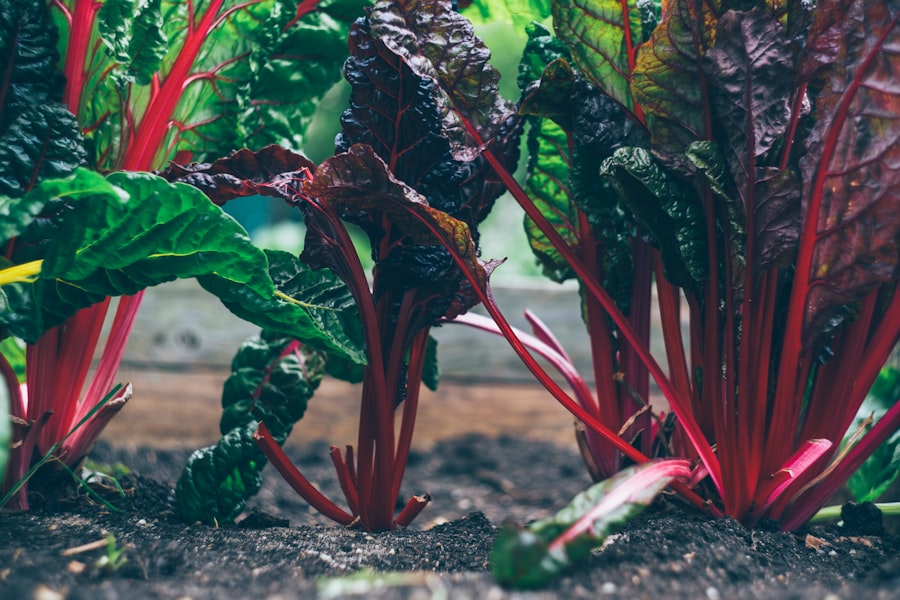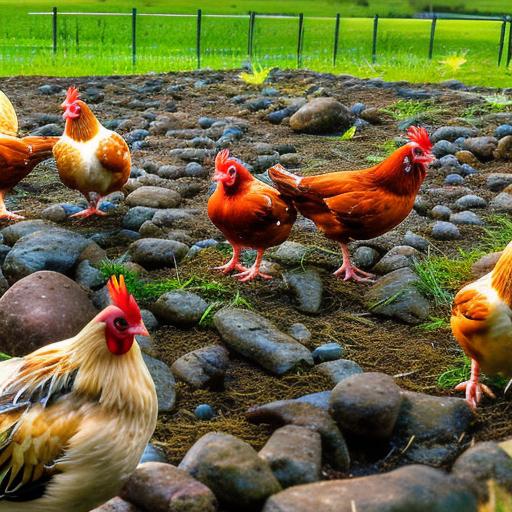The Barnsley Council’s Chicken-Keeping Initiative is a program aimed at promoting sustainable living and community involvement in the Barnsley area. The initiative encourages residents to keep chickens in their backyard, providing them with fresh eggs, meat, and fertilizer for their gardens. By participating in this initiative, residents can not only enjoy the benefits of keeping chickens but also contribute to a more sustainable and self-sufficient community.
Sustainable living has become increasingly important in today’s world, as we face challenges such as climate change and food security. By keeping chickens, residents can reduce their carbon footprint by producing their own food and reducing waste. Additionally, the initiative promotes community involvement by encouraging residents to share their knowledge and experiences with others, fostering a sense of camaraderie and support within the community.
Key Takeaways
- Barnsley Council has launched a chicken-keeping initiative to encourage residents to keep chickens in their backyards.
- Keeping chickens in Barnsley can provide numerous benefits, including fresh eggs, natural pest control, and fertilizer for gardens.
- Proper chicken coops are essential for the health and safety of chickens, and should be well-ventilated, predator-proof, and easy to clean.
- There are several types of chicken coops suitable for Barnsley’s climate, including wooden coops, plastic coops, and mobile coops.
- Building a chicken coop in Barnsley requires careful planning and consideration of local regulations and guidelines, which include limits on the number of chickens and coop placement.
Benefits of Keeping Chickens in Barnsley
There are numerous benefits to keeping chickens in Barnsley. One of the most obvious benefits is the availability of fresh eggs and meat. By keeping chickens, residents can have a constant supply of nutritious eggs and meat that are free from harmful chemicals and antibiotics. This not only provides a healthier option for consumption but also reduces reliance on store-bought eggs and meat.
Another benefit of keeping chickens is the fertilizer they produce for gardens. Chicken manure is rich in nutrients that can greatly improve soil quality and promote healthy plant growth. By using chicken manure as fertilizer, residents can reduce their reliance on synthetic fertilizers, which can be harmful to the environment.
Keeping chickens also provides educational opportunities for children. Children can learn about responsibility, animal care, and where their food comes from by participating in the care of the chickens. This hands-on experience can help children develop a deeper appreciation for nature and the importance of sustainable living.
Furthermore, keeping chickens is cost-effective and low-maintenance. Once the initial setup costs are covered, the ongoing expenses are minimal. Chickens require basic care such as feeding, watering, and cleaning, which can easily be incorporated into daily routines. In return, residents can enjoy the benefits of fresh eggs and meat without breaking the bank.
Understanding the Importance of Proper Chicken Coops
Proper chicken coops are essential for the well-being and safety of the chickens. A good chicken coop provides protection from predators, comfortable living conditions, and prevents the spread of diseases.
Protection from predators is crucial to ensure the safety of the chickens. Chicken coops should be designed to keep out predators such as foxes, raccoons, and rats. This can be achieved by using sturdy materials, secure fencing, and ensuring there are no gaps or holes that predators can squeeze through.
Comfortable living conditions are important for the health and well-being of the chickens. The coop should provide adequate space for the number of chickens being kept, with enough room for them to move around freely. It should also have proper ventilation to prevent overheating in the summer and insulation to keep the chickens warm in the winter.
Preventing the spread of diseases is crucial to maintain a healthy flock. Chicken coops should be kept clean and free from feces and other waste. Regular cleaning and disinfection of the coop can help prevent the spread of diseases such as salmonella and avian influenza.
Types of Chicken Coops Suitable for Barnsley’s Climate
When choosing a chicken coop for Barnsley’s climate, there are several factors to consider. The weather and temperature in Barnsley can vary greatly throughout the year, so it’s important to choose a coop that can withstand these changes.
There are different sizes and designs of chicken coops available, depending on the number of chickens being kept and personal preferences. Some coops are designed to be portable, allowing residents to move them around their backyard to provide fresh grazing areas for the chickens. Others are more permanent structures that can be customized to fit the available space.
Materials and cost are also important considerations when choosing a chicken coop. Coops can be made from a variety of materials such as wood, metal, or plastic. Each material has its own advantages and disadvantages in terms of durability, insulation, and cost. It’s important to choose a coop that fits within your budget while still providing a safe and comfortable environment for the chickens.
How to Build a Chicken Coop in Barnsley
Building a chicken coop in Barnsley can be a rewarding DIY project. Here is a step-by-step guide to help you get started:
1. Determine the size and design of your coop based on the number of chickens you plan to keep and the available space in your backyard.
2. Gather the necessary tools and materials, including lumber, screws, wire mesh, roofing material, and nesting boxes.
3. Start by building the frame of the coop using the lumber. Make sure it is sturdy and secure.
4. Attach wire mesh to the frame to create walls and a roof. This will provide ventilation while keeping predators out.
5. Install nesting boxes inside the coop for the chickens to lay their eggs.
6. Add roosting bars for the chickens to perch on at night.
7. Install a door that can be securely closed at night to protect the chickens from predators.
8. Add bedding material such as straw or wood shavings to the floor of the coop.
9. Install a feeder and waterer inside the coop for easy access for the chickens.
10. Customize your coop with any additional features or decorations you desire.
Regulations and Guidelines for Keeping Chickens in Barnsley

Before starting your chicken-keeping journey in Barnsley, it’s important to familiarize yourself with the regulations and guidelines set by the Barnsley Council. These regulations are in place to ensure the well-being of the chickens and to minimize any potential nuisance to neighbors.
Permits and licenses may be required to keep chickens in certain areas of Barnsley. It’s important to check with the local council to determine if any permits are needed and to obtain them if necessary.
The number of chickens allowed may also be regulated. This is to prevent overcrowding and ensure that the chickens have enough space to live comfortably. The regulations may specify a maximum number of chickens allowed per household or per square meter of land.
Noise and odor regulations may also be in place to prevent any disturbances to neighbors. It’s important to keep noise levels down, especially early in the morning when chickens are most active. Additionally, proper coop maintenance and regular cleaning can help minimize any odors that may arise from keeping chickens.
Where to Buy Chickens and Chicken Feed in Barnsley
When starting your chicken-keeping journey in Barnsley, it’s important to know where to buy chickens and chicken feed. There are several local suppliers and farms in the area that specialize in poultry.
Local suppliers and farms can provide you with healthy and well-cared-for chickens. They can also offer advice and support for new chicken owners, helping you choose the right breed for your needs and providing information on proper care and nutrition.
When choosing a breed of chicken, it’s important to consider factors such as egg production, temperament, and suitability for your climate. Some popular breeds for backyard chicken-keeping include Rhode Island Reds, Sussex, and Leghorns.
In addition to chickens, local suppliers and farms also offer a variety of chicken feed options. It’s important to provide a balanced diet for your chickens, including a mix of grains, protein, vitamins, and minerals. Some feeds are specifically formulated for different stages of a chicken’s life, such as chick starter feed for young chicks or layer feed for hens that are laying eggs.
Caring for Chickens: Feeding, Watering, and Cleaning
Caring for chickens involves daily routines such as feeding, watering, and cleaning. Here are some tips to help you provide the best care for your chickens:
Feeding: Chickens should be fed a balanced diet that includes a mix of grains, protein, vitamins, and minerals. Commercial chicken feed is readily available and provides a convenient option for meeting their nutritional needs. Additionally, chickens can also be fed kitchen scraps such as vegetable peelings and leftover grains. It’s important to avoid feeding them foods that are toxic to chickens, such as chocolate or avocado.
Watering: Clean and fresh water should be provided to chickens at all times. Chickens need access to water to stay hydrated and maintain their overall health. Waterers should be cleaned regularly to prevent the buildup of bacteria or algae.
Cleaning: Regular cleaning of the coop is essential to maintain a healthy living environment for the chickens. Remove any soiled bedding and replace it with fresh bedding. Clean the nesting boxes regularly to prevent the buildup of bacteria or parasites. Additionally, the coop should be thoroughly cleaned and disinfected periodically to prevent the spread of diseases.
Common Health Issues in Chickens and How to Prevent Them
Chickens can be susceptible to various health issues, but with proper care and preventative measures, many of these issues can be avoided. Here are some common health issues in chickens and how to prevent them:
Signs of illness: It’s important to monitor your chickens for any signs of illness. Common signs include lethargy, loss of appetite, abnormal droppings, respiratory issues, or changes in behavior. If you notice any of these signs, it’s important to seek veterinary care as soon as possible.
Preventative measures: Good hygiene practices can help prevent many health issues in chickens. This includes regular cleaning of the coop, providing clean water and feed, and practicing biosecurity measures to prevent the introduction of diseases. Quarantining new chickens before introducing them to the flock can also help prevent the spread of diseases.
When to seek veterinary care: If you notice any signs of illness in your chickens, it’s important to seek veterinary care. A veterinarian with experience in poultry health can diagnose and treat any health issues your chickens may have. They can also provide advice on preventative measures and general care for your flock.
Why Barnsley Council Encourages Chicken-Keeping and How to Get Involved
The Barnsley Council’s Chicken-Keeping Initiative is a valuable program that promotes sustainable living and community involvement in the Barnsley area. By keeping chickens, residents can enjoy the benefits of fresh eggs, meat, and fertilizer while reducing their carbon footprint and contributing to a more self-sufficient community.
To get involved in the initiative, residents can start by familiarizing themselves with the regulations and guidelines set by the Barnsley Council. This includes obtaining any necessary permits or licenses and adhering to noise and odor regulations.
Residents can then choose a suitable chicken coop based on their needs and the climate in Barnsley. Building a coop or purchasing one from a local supplier or farm are both viable options.
Once the coop is set up, residents can purchase chickens and chicken feed from local suppliers or farms. It’s important to choose a breed that is suitable for your needs and climate, and to provide a balanced diet for your chickens.
Caring for chickens involves daily routines such as feeding, watering, and cleaning. By following proper care practices and monitoring for signs of illness, residents can ensure the health and well-being of their flock.
Overall, the Barnsley Council’s Chicken-Keeping Initiative provides an opportunity for residents to embrace sustainable living, connect with their community, and enjoy the benefits of keeping chickens. By getting involved in this initiative, residents can contribute to a more self-sufficient and environmentally friendly Barnsley.
If you’re interested in Barnsley Council’s initiative of keeping chickens, you might also want to check out Poultry Wizard’s website. They offer a wealth of information on poultry keeping, including tips on building a farmhouse chicken coop. Their article on farmhouse chicken coop provides valuable insights and practical advice for creating a comfortable and functional space for your feathered friends. Additionally, if you’re considering adding geese to your flock, Poultry Wizard has an interesting article on whether geese can eat chicken feed. You can find it at https://poultrywizard.com/keeping-geese/can-geese-eat-chicken-feed/. Happy reading and happy poultry keeping!
FAQs
What is the article about?
The article is about Barnsley Council’s decision to allow residents to keep chickens in their gardens.
Why did Barnsley Council make this decision?
Barnsley Council made this decision to promote sustainable living and encourage residents to produce their own food.
What are the rules for keeping chickens in Barnsley?
Residents are allowed to keep up to six chickens in their gardens, but they must be kept in a secure coop and run. Roosters are not allowed.
Do residents need a permit to keep chickens?
No, residents do not need a permit to keep chickens in Barnsley.
What are the benefits of keeping chickens?
Keeping chickens can provide a source of fresh eggs, reduce food waste by composting scraps, and provide natural pest control in the garden.
Are there any downsides to keeping chickens?
Chickens can be noisy and may disturb neighbors if not kept in a secure coop. They also require daily care and maintenance.
What should residents do if they have concerns about their neighbors keeping chickens?
Residents should first try to speak with their neighbors and address any concerns directly. If the issue cannot be resolved, they can contact Barnsley Council’s Environmental Health department.
Meet Walter, the feathered-friend fanatic of Florida! Nestled in the sunshine state, Walter struts through life with his feathered companions, clucking his way to happiness. With a coop that’s fancier than a five-star hotel, he’s the Don Juan of the chicken world. When he’s not teaching his hens to do the cha-cha, you’ll find him in a heated debate with his prized rooster, Sir Clucks-a-Lot. Walter’s poultry passion is no yolk; he’s the sunny-side-up guy you never knew you needed in your flock of friends!







